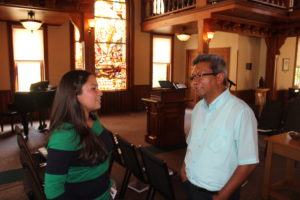Columbian peacemaker visits Maryville College

“We all bear the power to be instruments of change,” said the Reverend Luis Fernando Sanmiguel, through his translator, Daniel Pappas. “Not only to people, but also to the world and the environment.”
“The Bible says that the Lion will lay down with the Lamb,” he continued. “Do you believe that?”
The words went out from the pulpit and seemed to cling to the walls of the Center for Campus Ministry. Perhaps it goes without saying that this was probably not the first time that many of the visitors to the CCM had heard these phrases. These statements took on new life, however, under the diction of the Rev. Sanmiguel.
When the Rev. Sanmiguel talked of being an instrument of change, he was not speaking in the abstract or in the future tense. He was addressing the difficult situations that his home country, Colombia, has had to live through and resolve over the last seven decades, as well as the part he has played in the attempts to remedy these quagmires.
The Rev. Sanmiguel is a peacemaker, a position that has gained increased importance over the last five years, as the Colombian government has entered into peace negotiations with the Revolutionary Armed Forces of Colombia, or FARC. For the Rev. Sanmiguel, and Colombia as a whole, peace is not a feeling or form of sentimentality, it is a much-hoped-for societal desire.
Colombia’s situation was forged nearly seven decades ago when a civil war broke out after the progressive presidential candidate Jorge Eliecer Gaitan was assassinated. Although the initial civil war ended in 1953, societal unrest remained, ultimately culminating in the founding of FARC in 1964.
Since 1964, FARC has remained a powerful force in Colombia—expanding militarily to the point where they rivalled the Colombian military. Over time, however, both sides came to understand that neither had the upper hand, and the war was at an impasse.
This stalemate, however, has only come about after the gravest of expenses. At this point, the casualties in the war number nearly 220,000 killed—180,000 of which were civilians and 40,000 being military personnel. To date, the fighting in Colombia is the longest-raging military conflict in the Western Hemisphere.
The Rev. Sanmiguel was amazing, however, in that he says next to nothing about the peace talks that have brought him to Maryville. He didn’t mention the dead or the conditions that called him into the position of peacemaker.
Instead, the sermon he gave was based wholly on the underlying principle for the peace talks, namely, the love of others. The Rev. Sanmiguel told us that if we make ourselves important, then we must, by the same principle, make our neighbors important as well.
“I love the theology of Creation found in Genesis 1:26-27,” he said. “It says that God created all humanity. God did that!”
Two days before he spoke at the CCM, a democratic referendum held in Colombia to finalized the peace accords voted to deny the peace agreement with FARC. The news did not seem to have as negative of an effect on the Rev. Sanmiguel as some would suppose. It can be supposed, that adversity is a key element in the life of those who seek peace.

